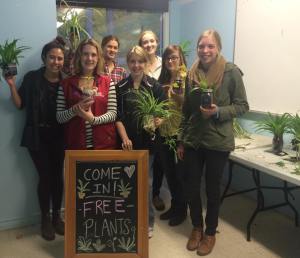This past Wednesday I had the privilege of volunteering at the Wellington Woods Community Centre with the University of Guelph Horticulture Club. The event was advertised to the residents of Wellington Woods, which is a university residence for families with young kids and upper year students who come from a variety of cultural backgrounds. The event was geared toward social interactions, plants, and arts and crafts.
The Horticulture club provided spider plants grown earlier in the year along with mason jars, soil, and gravel to pot and decorate the plants. This event was directed by Lissa Schoot Uiterkamp of the Horiculture Club and RES Life.
Spider Plant = Chlorophytum comosum. A hardy flowering perennial herb.
People of all ages arrived at the community centre from 5pm through 7pm on Wednesday October 14th. Many people from different backgrounds came together to pot their spider plants.
The plants ranged from the common all-green variety to other modified versions with white or red sections in the leaves. The mature plants had small white flowers. Spider plants are easy to grow as house plants. They will survive in less than perfect conditions although they thrive in direct sunlight. These plants are perfect for introducing children to plant care as they are able to grow in shady environments with partial sun, as well as they are very easy to propagate without damaging. If you obtain your own spider plant, be sure to water it daily, ensuring damp soil!
Spider plants have large white fleshy roots
I learned how to propagate the larger plants to fit into the mason jars.
We encouraged the residents to decorate their mason jars with ribbon, stickers, and drawings. The children were very excited to personalize their chosen plant. Many children were also fascinated with how large the plants will grow, as the baby plants were 1 to 3 inches tall (Ageing plants grow ~ 3 feet tall).
It was refreshing to witness a community of many languages and ages come together to learn, pot plants, decorate their jars, and drink hot chocolate.

This next photo series was my favourite. This young boy’s mother told him to show me the plant so I could take a picture of him. He gladly shoved his spider plant into my camera for a quality photograph.
“Heeere!”
A resident taught us how to make hanging water bottle pots to encourage recycling. It was a very enlightening experience for me to participate in this event. Some children were so excited that they volunteered to search the area to promote the event. All this, despite it pouring outside!
More about the Horticulture Club
The goal of the Horticulture Club is to bring people together across many different disciplines to share their love for plants. It originated in 1908 with the intent to provide a means of discussing content not covered in class. Today their objective is to “enhance the educational experience of any University of Guelph student with an interest in horticulture”.
Horticulture:
-The art/practice of garden cultivation and management
-The cultivation of a garden, orchard, or nursery
-The cultivation of flowers, fruits, vegetables, or ornamental plants
Meetings for the Horticulture Club are held at the Bovey Tropical Greenhouse in Edmund C. Bovey Building every other Wednesday.
















Leave a Reply
You must be logged in to post a comment.